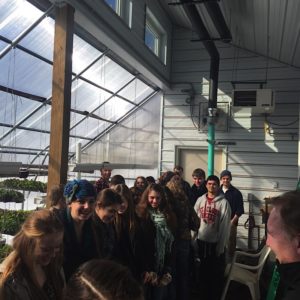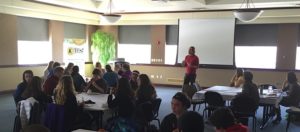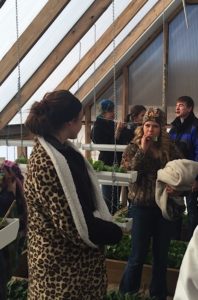By YES! Coordinator Jonathan Morales
Anyone who thinks the only things you can harvest during Minnesota winters are icicles should have been at the YES! Winter Workshop that took place on March 4th at the College of St. Benedict. There, winter greenhouses were celebrated and the students who attended explored ways for more schools to have their own local foods during Minnesota winters.
The day started out with a conversation with Alex Chocholousek, Sustainability Fellow at the College of St. Benedict, about how the college is approaching sustainability and honoring their commitment to the American College & University Presidents’ Climate Commitment (ACUPCC). Saint John’s University joined the almost 700 colleges and universities fighting climate change when they signed the ACUPCC in 2007. As a part of the ACUPCC, they are working towards their agreement to complete an emissions inventory, set a date to become climate neutral, take immediate steps to reduce greenhouse emissions, integrate sustainability into the curriculum, and make an action plan.

After the morning introduction, all twenty YES! students ventured over to see the College of St. Benedict’s Full Circle Winter Greenhouse. Here, students from the College of St. Benedict and St. John’s Universities gave the students a tour of the greenhouse, showing off the passive solar features that keep the greenhouse warm even on the coldest of winter days. By taking hot air off the ceiling of the greenhouse and putting it into a foundation of rock, it stores heat for cold nights. The greenhouse, built in 2013 along with a similar greenhouse at St. John’s University, was funded through contributions from the Student Senate, the President’s Office, the Facilities Department and grants. Students also visited the greenhouse at St. John’s where three members from the Eco House, who manage the greenhouse, gave a tour. They estimated about 100 pounds of produce are grown in each greenhouse each season.

After the tours, the students had the opportunity to listen to some experts in the realm of local foods. Ryan Cutter, a fellow winter greenhouse farmer, spoke about how he has turned his winter greenhouse into a small business. By supplying just one restaurant, he has been able to customize his operation and minimize waste.
Lisa Baker, with Bakers Acres, provided great insight into what a sustainable farm looks like. Even though they have 15 acres of land, they only farm 2-3 acres at a time, allowing the remaining portion to rest and recoup needed nutrients rather than using chemical fertilizers. In order to get a jump on the season, they use hoop houses to start plants and even took it a step further by adding an additional smaller hut in the hoop house with some heat to start seedlings. They also have grass-fed beef and are experimenting with contour farming.

Next up was Natalie Keane with the Minnesota Street Market, a cooperatively-owned store that sells local food and local art in downtown St. Joseph. She helped develop the Community Kitchen which seeks to integrate the campus and community to increase access to high quality and nutritious food through a multifaceted, innovative approach to alleviating food insecurity with an emphasis on rural Stearns County. Their meal-delivery program utilizes surplus food on campus and in the community as a catalyst for education, collaboration, and community action. Natalie emphasized the need for people to vote for sustainable foods by simply purchasing local, sustainable products.
Finally, Laura Perdue, University Minnesota Extension Health and Nutrition Educator, provided the students with resources that will be useful as they work through their local foods projects. The focus of her work revolves around improving food literacy, physical activity, and healthy food access. This is accomplished in many ways, such as the SNAP-Ed program, School Wellness Programs, MN Food Charter, and SHIP Program funding.
The day wrapped up with everyone putting their heads together to create a vision statement for the proposed deep winter greenhouse at Royalton High School. After an inspirational day, the Royalton YES! team is well on their way to being pioneers for the winter local foods movement in Minnesota!
